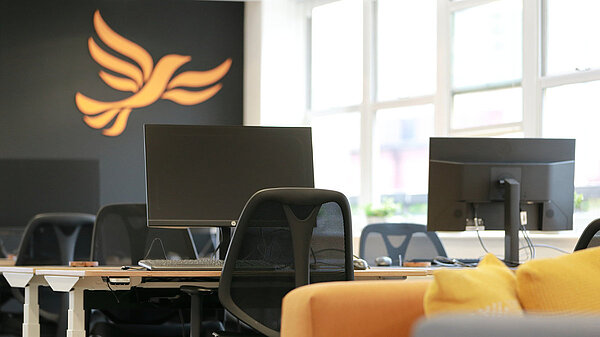Government’s mental health plans leave children in 3 in 4 primary schools without NHS support
EMBARGO: Immediate Release
Government’s mental health plans leave children in 3 in 4 primary schools without NHS support
Pupils at almost three in four primary schools (73.4%) will not be able to access NHS mental health support at school by the end of next year, Liberal Democrats have revealed.
The figures also show that Mental Health Support Teams (MHSTs) will only be in place in around half (53.5%) of secondary schools by the end of 2024. Funding to roll out the teams ends next year.
Ministers have refused to confirm if MHSTs will be rolled out to every school beyond 2024. Health Minister Maria Caulfield said that “financial plans… will be confirmed in due course”, whilst the Education Secretary could commit only to “putting the case forward for continuing the roll-out”.
Health chiefs have said that, without any further funding, they could use the existing NHS budget to fund the teams for an extra year. However, they could not guarantee how the teams will fare in the next Spending Review.
Liberal Democrat education spokesperson Munira Wilson MP has slammed the Government for the slow pace of the rollout and is calling on Ministers to fund a qualified mental health practitioner in every school.
MHSTs were announced by the Government in 2017 to deliver cognitive behavioural therapy and other low-level support to young people in schools and colleges. Yet according to official estimates, each team, typically consisting of around eight staff, will need to support 16.7 schools and colleges on average, that teach 8,500 pupils between them.
The Liberal Democrats sent Freedom of Information requests to each NHS Integrated Care Board (ICB) in England, revealing a huge postcode lottery in the rollout of MHSTs across the country:
-
In Cornwall and the Isles of Scilly, MHSTs only cover primary schools, with a remit to prioritise pupils “in reception year and [in] the transition into year 7.” Even then, only 47% of primary schools in the area are covered.
-
By contrast, the Surrey Heartlands ICB - which covers most of the county - operates MHSTs in four out of 10 secondary schools but less than one in 10 primaries. Four more MHSTs will become operational by the end of next year.
-
Buckinghamshire, Oxfordshire and West Berkshire ICB has the slowest rollout, with their existing or planned teams covering just one in five secondary schools and one in 10 primaries. In Oxfordshire, each team supports 16,000 pupils - almost double the national average - spread across between 35 and 77 schools.
-
Among the ICBs that provided comparable data, MHSTs in the North East and North Cumbria spend the least money per pupil (£24), whilst spending in Surrey is more than triple that amount.
The shocking statistics add to concerns about the rapidly increasing crisis in children’s mental health:
-
According to NHS Digital, the number of children aged 7-16 with a probable mental health disorder has risen from 12.1% in 2017 to 18% in 2022;
-
Data obtained by the Children’s Commissioner shows that the average waiting time to access children and young people’s mental health services rose to 40 days in 2021-22;
-
Research carried out by The House magazine showed that a quarter of a million children were denied NHS mental health treatment or redirected elsewhere due to burgeoning caseloads.
Liberal Democrat Education spokesperson Munira Wilson MP said:
“The Government is letting down our children and young people. Our children’s mental health services were in crisis before the pandemic, but Conservative Ministers have failed completely to grasp the scale of the tidal wave in mental ill health that has emerged since.
“Under the Tories, a school that sees an NHS mental health professional for a day a week is one of the lucky ones. Meanwhile, tens of thousands of children are left waiting to see if mental health support will be rolled out at their school or sacrificed to pay for the Government’s economic incompetence. Yet failing to roll out the programme will simply make waiting times for acute CAMHS even worse.
“Liberal Democrats would invest in our children by putting a qualified mental health professional in every school so that more young people come to school happy, healthy and ready to learn.”
ENDS
Notes to Editors:
The Liberal Democrats sent FOI requests to every NHS Integrated Care Board in England, asking for details about every MHST that operates in their area or that will be operational by the end of 2024, including:
-
Its name and location;
-
The number of primary schools, secondary schools, FE colleges and other settings it serves;
-
The approximate number of pupils it serves;
-
Its approximate annual budget (most ICBs gave their budget for 2022/23 but some did so for 2021/22);
-
The number of full-time equivalent clinical and non-clinical staff assigned to each MHST.
31 out of the 42 ICBs provided some data. Munira Wilson MP also commissioned the House of Commons Library to estimate the total number of primary and secondary schools in each ICB area, and the number of pupils who attend them.
The results are available below.
-
Number of primary and secondary schools that will be served by MHSTs by the end of 2024
ICB Name | Secondary schools served | Primary schools served | # of Secondary Schools in the ICB area | # of Primary Schools in the ICB area | % of Secondary Schools Served | % of Primary Schools Served |
South West London | 52 | 160 | 75 | 306 | 69.33% | 52.29% |
North Central London | 57 | 175 | 61 | 349 | 93.44% | 50.14% |
Cornwall and Isles of Scilly | 0 | 105 | 31 | 224 | 0.00% | 46.88% |
Gloucestershire | 31 | 100 | 41 | 237 | 75.61% | 42.19% |
Nottingham North and Nottinghamshire | 46 | 120 | 72 | 304 | 63.89% | 39.47% |
Staffordshire & Stoke-on-Trent | 34 | 141 | 83 | 361 | 40.96% | 39.06% |
Cambridgeshire & Peterborough | 18 | 79 | 44 | 275 | 40.91% | 28.73% |
Derby & Derbyshire | 24 | 116 | 58 | 414 | 41.38% | 28.02% |
Norfolk and Waveney | 24 | 96 | 57 | 376 | 42.11% | 25.53% |
Hertfordshire & West Essex | 62 | 114 | 96 | 488 | 64.58% | 23.36% |
Mid and South Sussex | 42 | 66 | 69 | 312 | 60.87% | 21.15% |
Kent and Medway | 48 | 104 | 113 | 528 | 42.48% | 19.70% |
Lancashire and South Cumbria | 101 | 122 | 110 | 627 | 91.82% | 19.46% |
Humber and North Yorkshire | 56 | 109 | 99 | 595 | 56.57% | 18.32% |
Devon | 32 | 60 | 64 | 393 | 50.00% | 15.27% |
Buckinghamshire, Oxfordshire and Berkshire West | 20 | 61 | 100 | 570 | 20.00% | 10.70% |
Surrey Heartlands | 20 | 23 | 48 | 249 | 41.67% | 9.24% |
TOTAL | 692 | 1,861 | 1,293 | 7,005 | 53.52% | 26.57% |
2. MHST funding per pupil
N.B. These statistics were calculated using only MHSTs where the ICB provided both (1) their annual budget and (2) the approximate number of pupils they served.
Name of ICB | Spending per pupil on MHSTs |
Buckinghamshire, Oxfordshire and Berkshire West | £43 |
Derby & Derbyshire | £70 |
Devon | £36 |
Gloucestershire | £41 |
Hertfordshire & West Essex | £34 |
Humber and North Yorkshire | £43 |
Kent and Medway | £43 |
North Central London | £50 |
North East and North Cumbria | £24 |
Nottingham North and Nottinghamshire | £37 |
South West London | £51 |
Staffordshire & Stoke-on-Trent | £42 |
Surrey Heartlands | £87 |
Sussex | £36 |

